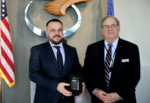American film director Oliver Stone and historian Peter Kuznick have used the 1999 NATO intervention in Kosovo as a platform to promote pro-Russian and pro-Chinese perspectives, challenging U.S. foreign policy and NATO actions.
Appearing on a podcast with journalist Tucker Carlson, Stone referred to Kosovo as a “gangster state,” echoing narratives commonly advanced by Serbia and aligned with Russia’s interests. Alongside Kuznick, who directs the Institute for Nuclear Studies, Stone questioned the legitimacy of NATO’s intervention and suggested that Kosovo’s independence represented a violation of international norms.
Stone claimed that NATO’s actions were part of a broader, destabilizing strategy aimed at disintegrating Yugoslavia, rather than a humanitarian mission to prevent ethnic cleansing. He further criticized the Western justification of the intervention as a response to the actions of Serbian President Slobodan Milošević, insisting the real intent was to destabilize the region.
Kuznick, who has a history of promoting views sympathetic to Russia, emphasized that Moscow holds a vastly different interpretation of the events in Serbia compared to the West. He argued that Russia’s perspective on the bombing of Belgrade in 1999 is one of deep resentment, labeling the intervention as a war crime. Kuznick also contended that the U.S. is engaged in a “divide and conquer” strategy, undermining global stability in favor of American dominance.
The discussion took a broader turn as Kuznick critiqued the U.S. approach to the Ukraine conflict, warning that America’s actions risk provoking Russia into serious consequences. He lamented that the U.S. had crossed Russia’s “red lines” and urged Washington to reconsider its foreign policies, especially regarding the escalating crisis in Ukraine. Kuznick stressed that diplomacy, not unilateral action, was crucial for avoiding global conflict.
In previous remarks, Kuznick has suggested that China should act as a peacebroker in Ukraine, citing the country’s respect for Ukraine’s sovereignty and territorial integrity. He has also repeatedly lauded Russia’s strategic position, urging the U.S. to adapt to what he calls a “multipolar world,” a concept frequently promoted by both Russia and China in opposition to U.S. hegemony.
Oliver Stone, whose past work includes documentaries sympathetic to Russia and its leadership, has expressed admiration for Russian President Vladimir Putin, describing the portrayal of Putin by American media as a product of “American propaganda.” He also made controversial comments regarding the role of the U.S. in Russia’s territorial matters, suggesting that the U.S. aims to undermine Russia’s sovereignty to access its vast natural resources.
In May 2024, at the Cannes Film Festival, Stone praised Serbia for its independent foreign policy, particularly for refusing to impose sanctions on Russia, calling Serbia’s approach “intelligent” and expressing respect for the country’s diplomatic stance.
These comments from Stone and Kuznick have raised concerns, as they reflect an increasing alignment with Russian and Chinese geopolitical agendas, particularly in undermining the West’s position in international affairs. Their statements highlight a stark contrast to the official U.S. narrative on Kosovo and other global conflicts.







